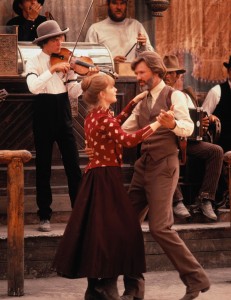Heaven’s Gate
2013. GB. DVD / Blu-ray. Second Sight. 216 minutes (plus extras). Certificate 15. RRP £15.99 (DVD), £19.99 (Blu-ray).
About the reviewer: Dr Miles Booy gained his doctorate in film studies from the University of East Anglia. He is the author of Love and Monsters: The Doctor Who Experience, 1979 to the Present (IB Tauris, 2012) and his other publications include contributions to The Cult TV Book (2010).
Michael Cimino’s Heaven’s Gate arrives on blu-ray after some critically-acclaimed revival screenings at film festivals. This contrasts with 1980/81 when the film’s spiralling budget sank both the film and United Artists, taking several promising careers down with it. It received scathing reviews, probably because news reports of its runaway production set people up to see a hubristic mess.
 Heaven’s Gate (more or less) retells the events of Johnson County, Wyoming in the early 1890s when landed cattle barons and immigrant farmers fought over the land use in the county. Consequently, we generally think of it as a western, a description which whilst not being untrue leaves a lot unsaid. The opening sequence finds us in Harvard in 1870. It is graduation day and a band plays the Battle Hymn of The Republic. The film’s languid pace is established in the twenty minutes of graduation ritual which follow: dances, speeches, the men serenade the ladies. Amidst a wealth of detail, we vaguely follow characters played by Kris Kristofferson and John Hurt. We then leap forward twenty years to Wyoming. Now, the established land barons who are using the land for raising cattle despise the influx of poor immigrant farmers, who threaten the established monopolies. Using the immigrants’ sporadic stealing of cattle to feed starving families as an excuse, the barons hire gunslingers to kill immigrant farmers. It’s clear what thematic terrain the film will furrow: the contrast of youthful promise, personal and national, with the compromises of growing up. ‘What the Hell are you doing here?’ asks Hurt when unexpectedly reunited with Kristofferson. What indeed? The film concludes off the coast of Newport, Rhode Island, the town where New York’s mega-rich built their ‘holiday cottages’ (ie: three or four storey mansions) with a sad coda which makes it clear that …but why give away the ending?
Heaven’s Gate (more or less) retells the events of Johnson County, Wyoming in the early 1890s when landed cattle barons and immigrant farmers fought over the land use in the county. Consequently, we generally think of it as a western, a description which whilst not being untrue leaves a lot unsaid. The opening sequence finds us in Harvard in 1870. It is graduation day and a band plays the Battle Hymn of The Republic. The film’s languid pace is established in the twenty minutes of graduation ritual which follow: dances, speeches, the men serenade the ladies. Amidst a wealth of detail, we vaguely follow characters played by Kris Kristofferson and John Hurt. We then leap forward twenty years to Wyoming. Now, the established land barons who are using the land for raising cattle despise the influx of poor immigrant farmers, who threaten the established monopolies. Using the immigrants’ sporadic stealing of cattle to feed starving families as an excuse, the barons hire gunslingers to kill immigrant farmers. It’s clear what thematic terrain the film will furrow: the contrast of youthful promise, personal and national, with the compromises of growing up. ‘What the Hell are you doing here?’ asks Hurt when unexpectedly reunited with Kristofferson. What indeed? The film concludes off the coast of Newport, Rhode Island, the town where New York’s mega-rich built their ‘holiday cottages’ (ie: three or four storey mansions) with a sad coda which makes it clear that …but why give away the ending?
This scope and ambition, of course, doesn’t mean it isn’t a western, though the politicised accusations (“anarchist” etc), the rejection of desert settings in favour of wooded grasslands, and many other aesthetic choices, rail against the genre’s traditional iconography. The relatively late setting is the clue: this is what happened after the frontier was settled, the pioneers moved further west and the businessmen moved into town, building basic settlements into fully-functional towns. This isn’t the settlement of the desert, but a wider epic of national origins, a label which lesser films like Far and Away and Gangs of New York have found it more profitable to make (Gangs’ director Martin Scorsese has been a long-term supporter of Heavens Gate). That said, the film again doesn’t follow too traditional a genre path. It doesn’t labour the point about immigration. There’s no Ellis Island entry, no urban ghettos. The immigrant experience is part of the story, but it rarely comes in to focus as an organizing principle. Part of the film’s ‘difficulty’ of course, lies in exactly this refusal to grant audiences easy genre cues to read the action.
 Learning on Screen
Learning on Screen